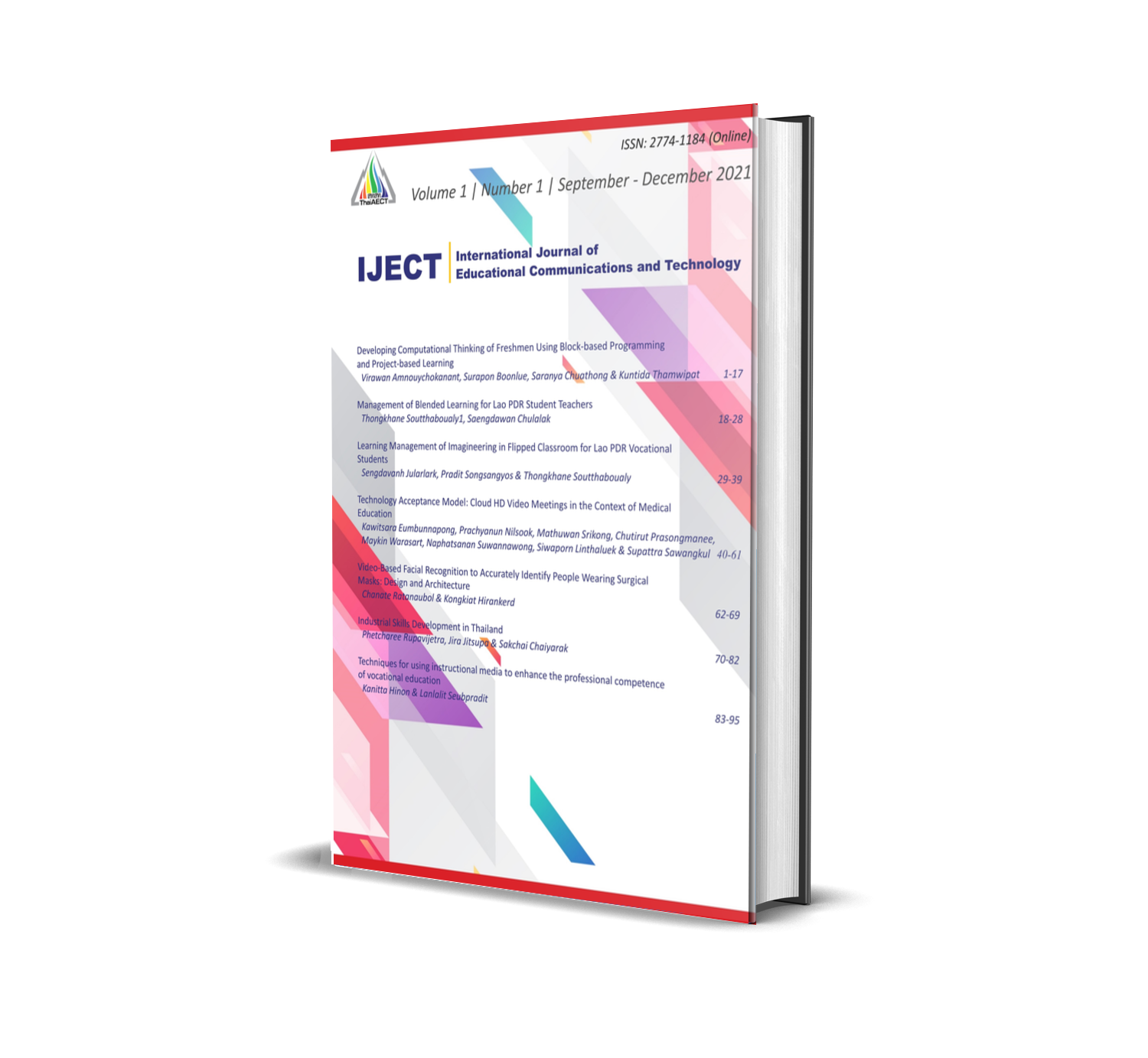Online Active Learning Activities to Enhance English Writing Skills for Non-native speakers in Vocational College
Keywords:
Active learning, Achievement, Satisfaction, English WritingAbstract
The purposes of this study were 1) To design non-native speakers’ Online Vocabulary Active Learning activities in English writing skills in a higher vocational college. 2) To assess the English writing learning achievement of Chinese higher vocational college students who participate in Online Active Learning activities by learning items before and after class and examining differences in the English writing learning achievement of students in three different learning groups (low, medium, and high background).3)To investigate the satisfaction of Chinese higher vocational college students with their online vocabulary Active English writing Learning Activities. The sample studies are 30 students in first-year students at Zhejiang Vocational College. Research tools include online active learning activities and a questionnaire measuring students’ satisfaction with online active teaching. Statistics for data analysis are percentage, arithmetic mean, standard deviation, t-test dependent, and ANOVA. The results were as follows: 1.The online active learning teaching method can effectively change students’ attitude toward English writing. Students’ writing attitude has become more positive and their interest in writing become stronger. 2. Compared with the traditional result teaching method, the online active learning teaching method can improve the English writing level of students at different group, especially middle and low-level students. 3. Most participants (more than 70%) believe that learning English writing skills through online active learning activities is very interesting and can create a good atmosphere in the classroom.
References
Adaros, A., & Esperanza, A. (2017). The Influence of Self-Regulation, Motivation, Proficiency, and Gender on L2 First-Year Writing Achievement.
Amir, S., & Hadi, S. (2016). Impact of explicit vocabulary instruction on writing achievement of upper-intermediate efl learners. International Education Studies, 9(4), 141.
B J. Zimmerman and A Bandura (1994). Impact of se1f- regulatory influences on writing course attainment. American: Educational Research Journa1.
Bao, W. (2019). On teachers’ professional qualities structure and development mechanisms in the business English discipline. Chinese Journal of Applied Linguistics, 42(2), 218-235.
Budiman, & Rahmat. (2015). A longitudinal study of student achievement and dropout in a distance learning English writing course.
Bymne, D (1998). Teaching Writing Skils. Pearson Education Ltd.
Carr, R., Palmer, S., & Hagel, P. (2015). Active Learning: the importance of developing a comprehensive measure. Active Learning in Higher Education, 16(3), 173-186.
Chang, I. Y., & Chang, W. Y. (2012). The effect of student learning motivation on learning satisfaction. International Journal of Organizational Innovation (Online), 4(3), 281.
Demir, M. D., & Tavil, Z. M. (2021). The effect of technology-based materials on vocational high school students’ listening skill. Journal of Language and Linguistic Studies, 17(1), 448-457.
Dumitrescu, C. I., Moldovan, M. L. C., & Ioana-Claudia Nuu. (2015). Improving functional texts writing skills in English as a foreign language. Procedia - Social and behavioural Sciences, 203, 168-172.
Dziuban, C., Moskal, P., Thompson, J., Kramer, L., & Hermsdorfer, A.. (2015). Student satisfaction with online learning: is it a
Entwistle, N. (2000). Approaches to Studying and Levels of Understanding: The Influences of. Higher Education: Handbook of Theory and Research 15, 15, 156.
Fan, W. R. (2021). A study of English Writing Test in Senior High School Entrance Examination on English Writing Teaching. Studies in Literature and Language, 23(1), 68-71.
Gherhe, V., Stoian, C. E., Frcaiu, M. A., & Stanici, M. (2021). E-learning vs. face-to-face learning: Analyzing students' preferences and behaviors. Sustainability, 13(8), 1-15.
Gibbons, S., Neumayer, E., & Perkins, R. (2015). Student satisfaction, league tables and university applications: evidence from Britain. Economics of Education Review, 48, 148-164.
Gray, J. A., & Diloreto, M. (2016). The effects of student engagement, student satisfaction, and perceived learning in online learning environments. International Journal of Educational Leadership Preparation.
Hasan, M., & Roy-Chowdhury, A. K. (2015). Context Aware Active Learning of Activity Recognition Models. 2015 IEEE International Conference on Computer Vision (ICCV). IEEE.
Ibáñez, M. B., Portillo, A. U., Cabada, R. Z., & Barrón, M. L. (2020). Impact of augmented reality technology on academic achievement and motivation of students from public and private Mexican schools. A case study in a middle-school geometry course. Computers & Education, 145, 103734.
Juan, C. (2021). A cultural and functional approach to the assessment of logical thinking ability in English writing. Scientific Programming.
Koross, B. T., Indoshi, F. C., & Okwach, T. (2015). Correlation between Teacher Factors and Students’ Achievement in English Functional Writing Skills in Secondary Schools in West Pokot County, Kenya.
Kriminger, E., Cobb, J. T., & Principe, J. C. (2015). Online Active Learning Activities for automatic target recognition. IEEE Journal of Oceanic Engineering, 40(3), 583-591.
Liao, Y. Q . (2016). The research of formative assessment on English writing teaching in higher vocational colleges. Journal of Tianjin Sino-German Vocational Technical College.
Lifang, D. U., & Department, F. L. (2018). On the negative transfer of mother tongue on the syntactic level in college English writing of higher vocational college. Journal of Zhenjiang College.
Ma, L., Destercke, S., & Wang, Y. (2016). Online Active Learning Activities of decision trees with evidential data. Pattern Recognition, 33-45.
Mallia, J. (2017). Strategies for developing English academic writing skills. Arab World English Journal, 8(2), 3-15.
Olson, C. B., Matuchniak, T., Chung, H. Q., Stumpf, R., & Farkas, G. (2017). Reducing achievement gaps in academic writing for latinos and english learners in rates. Journal of Educational Psychology, 109(1), 1-12.
Oskar-Poisson, C. A. (2017). Preparing English Educators to Teach Rhetorical Analysis as a Writing Skill: A Descriptive Program Analysis of New Hampshire Institutions of Higher Education. (Doctoral dissertation, New England College.).
Owens, D. C., Sadler, T. D., Barlow, A. T., & Cindi, S. W. (2020). Student motivation from and resistance to active learning rooted in essential science practices. Research in Science Education, 50(1), 253-277.
Palaniappa Manickam, M. Kamala. (2016). Stimulating deep learning using Active Learning techniques. Malaysian Online Journal of Educational Sciences, 4.
Rafael. (2017). The student satisfaction with educational podcasts questionnaire. Escritos de Psicología (Internet).
Riffell, S. K., & Sibley, D. H. (2003). Learning online. Journal of College Science Teaching, 32(6), 394.
Roberson Jr, D. N., & Merriam, S. B. (2005). The self-directed learning process of older, rural adults. Adult education quarterly, 55(4), 269-287.
Schenck, A. (2020). Examining the influence of native and non-native English-speaking teachers on Korean EFL writing. Asian-Pacific Journal of Second and Foreign Language Education, 5(2), 1-17.
Shan, Jicheng, Zhang, Hang, Liu, & Weike, et al. (2019). Online Active Learning Activities ensemble framework for drifted data streams. IEEE Transactions on Neural Networks and Learning Systems, 30(2), 486-498.
Teng, M. F. . (2021). The effectiveness of incorporating metacognitive prompts in collaborative writing on academic english writing skills. Applied Cognitive Psychology.
Toivainen, T., JJ Madrid, Alero, Chapman, R., Mcmillan, A., & Y Kovas. (2021). Creative expressiveness in childhood writing predicts
educational achievement beyond motivation and intelligence: a longitudinal, genetically informed study. British Journal of Educational Psychology (8).
Wang, S., & Hu, H. (2021). The analysis of the test for English vocabulary learning strategies under relativism. IOP Conference Series: Earth and Environmental Science, 692, 042087.
Yang, R. (2022). An empirical study of claims and qualifiers in ESL students’ argumentative writing based on Toulmin model. Asian-Pacific Journal of Second and Foreign Language Education, 7(1), 1-17.
Downloads
Published
How to Cite
Issue
Section
License
Copyright (c) 2022 International Journal of Educational Communications and Technology

This work is licensed under a Creative Commons Attribution-NonCommercial-NoDerivatives 4.0 International License.







